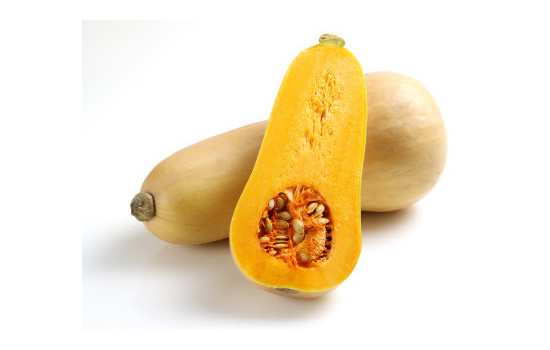Butternut is nutty, sweet tasting and quite like a sweet potato, while having the appearance of an elongated bell.
The skin of the butternut is easy to peel and thin (different to some other winter squash), although it can still be roasted with the skin in place. Butternut squash is loaded the nutritional benefits including fiber and vitamin A & C.
Below are five of the healthful benefits of butternut squash:
Carotenoids
Butternut squash is a reliable source of the major carotenoids groups: zeaxanthin, beta-carotene, lutein, and alpha-carotene. A form of vitamin A that benefits healthy skin and vision is retinol, which comes from beta-carotene and alpha-carotene. Other carotenoids like zeaxanthin and lutein are based in the retina and help to reduce problems related to macular degeneration and cataracts. A guided intake of vitamin A is 2333 IU (international units) for women and 3000 IU for men. A 1 cup serving of butternut squash can deliver about 14,761 IU.
Antioxidants
The antioxidant content in butternut squash helps to avoid damage to healthy cells that can result in serious illness. The benefit of manganese is the ability to protect the energy producing cellular structures. Vitamin E helps to provide antioxidant protection for fat-soluble compounds. Vitamin C is a water-soluble nutrient and moves through the body to neutralize free radicals that can cause damage to skin cells. A 1 cup serving of butternut squash can provide 27% of the daily vitamin C needs for women and 28% for men. Plus, the manganese content is about 17% of the daily value.
Fiber
Butternut squash is packed with insoluble and soluble dietary fiber. Soluble fiber helps the body absorb carbohydrates and stop the fast spikes in blood sugar. Soluble fiber also helps to control cholesterol levels. Insoluble fiber is helpful for adding bulk to food which makes it easier to digest and pass through the system to avoid constipation. A 1 cup serving of butternut squash has 8-12% of the RDA or grams of fiber content.
Electrolytes
Molecules that contain an electrical charge are known as Electrolytes and these pass through the body. These electrolytes are beneficial for the ability to control nerve impulses and muscle contraction. Butternut squash can provide a reliable source of three major types of electrolytes: calcium, magnesium, and potassium. Calcium and magnesium are needed to work in combination. Calcium is needed to stimulate the contraction of cardiovascular muscles, and magnesium relaxes the muscles. Potassium is helpful for its ability to work with sodium to assist with the contraction of muscles, and also regulates the heartbeat. A 1 cup serving of this fruit has about 12% of the DV of potassium, 7.2% of calcium, and 10.9% of magnesium.
Weight Loss
A low-energy and dense soup like roasted butternut squash is able to provide plenty of nutritional benefits, but is very low in relation to calories. Eating low-energy and dense foods often help those following a weight loss program as it is usually high with fiber and water which fills the stomach.

Speak Your Mind